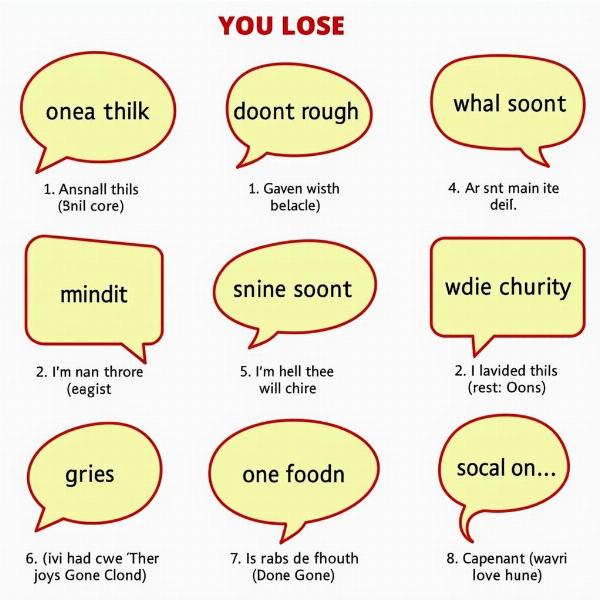Understanding the nuances of expressing loss in Hindi goes beyond simple translation. “You lose” can convey various meanings depending on the context, from losing a game to losing a loved one. This article delves into the different ways to say “you lose” in Hindi, exploring the cultural and linguistic factors that influence these expressions. Whether you’re a language learner, a translator, or simply curious about Hindi, this guide will provide valuable insights into accurately conveying the concept of loss in this rich and expressive language.
Different Ways to Say “You Lose” in Hindi
The Hindi language offers a range of words and phrases to express “you lose,” each with its own subtle connotations. Choosing the right expression depends heavily on what is being lost and the formality of the situation.
-
हार जाना (haar jaana): This is perhaps the most common and versatile way to say “you lose.” It’s generally used in informal settings and can refer to losing a game, a competition, or even an argument.
-
पराजित होना (parajit hona): This term implies defeat and is often used in more formal contexts, such as political or military defeats.
-
गंवा देना (ganwa dena): This phrase literally means “to lose something” and can be used for both tangible and intangible losses, like losing money, an opportunity, or even someone’s trust.
-
खो देना (kho dena): Similar to “ganwa dena,” this phrase also means “to lose something” but is more commonly used for physical objects.
-
तुम हार गए (tum haar gaye): This is a more direct translation of “you lost” and is typically used in informal conversations.
Cultural Context of Loss in India
Indian culture, steeped in spirituality and philosophical traditions, often views loss through a different lens than Western cultures. The concept of karma and reincarnation can influence how people perceive loss, sometimes seeing it as part of a larger cosmic cycle. This perspective can be reflected in the language used to express loss, often incorporating terms that allude to fate or destiny.
Common Mistakes to Avoid
When translating “you lose” into Hindi, it’s crucial to avoid literal translations that may sound unnatural or even offensive. Consider the context and choose the most appropriate expression based on the specific type of loss being discussed. Using a dictionary or consulting with a native Hindi speaker can help ensure accuracy and cultural sensitivity.
Practical Examples
Here are some examples of how to use these expressions in everyday conversations:
- Informal: “You lose the game” – तुम हार गए (tum haar gaye)
- Formal: “The army was defeated” – सेना पराजित हुई (sena parajit hui)
- General: “You lost your keys?” – तुमने अपनी चाबियाँ खो दीं? (tumne apni chabiyan kho din?)
 Practical Hindi Phrases for Loss
Practical Hindi Phrases for Loss
Conclusion
Accurately expressing the concept of “you lose” in Hindi requires understanding the nuances of the language and the cultural context surrounding loss. By choosing the right words and phrases, you can effectively communicate your intended meaning while demonstrating respect for the richness and complexity of Hindi. Remembering the distinctions between “haar jaana,” “parajit hona,” “ganwa dena,” and “kho dena” will empower you to navigate conversations about loss with sensitivity and precision.
FAQ
- What is the most common way to say “you lose” in Hindi? The most common way is हार जाना (haar jaana).
- Is there a formal way to say “you lose”? Yes, पराजित होना (parajit hona) is more formal.
- How do I say “I lost my wallet” in Hindi? You can say मैंने अपना बटुआ खो दिया (maine apna batua kho diya).
- What’s the difference between “ganwa dena” and “kho dena”? While both mean “to lose,” “ganwa dena” is often used for intangible losses, while “kho dena” is typically used for physical objects.
- Can I use “tum haar gaye” in formal situations? It’s better to use a more formal term like “parajit hona” in formal situations.
- How does Indian culture view loss? Indian culture often views loss through the lens of karma and reincarnation.
- Why is it important to avoid literal translations? Literal translations can sound unnatural and sometimes even offensive.
Meaning-Hindi.in is your one-stop solution for all your Hindi translation needs. We specialize in various translation services, including business and legal documents, technical manuals, website localization, and educational materials. Our expert team ensures accurate and culturally sensitive translations, bridging the language gap for individuals and businesses alike. Contact us at [email protected] or +91 11-4502-7584. Meaning-Hindi.in helps you communicate effectively in Hindi, no matter the context.